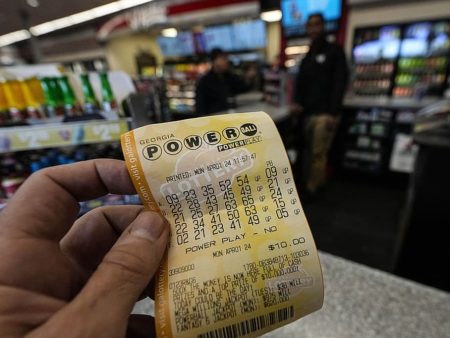Highest Lottery Right Now 2024 Results: Unveiling the Year’s Biggest Jackpot Winner Top Ten Lottery
Highest Lottery Right Now 2024 Results: Unveiling the Year’s Biggest Jackpot Winner
Highest Lottery Right Now 2024 Results: Unveiling the Year’s Biggest Jackpot Winner
In a year brimming with anticipation and dreams, the “Highest Lottery Right Now 2024 Results” have finally been unveiled, capturing the attention of millions worldwide. As hopeful participants eagerly awaited the outcome, the announcement of the year’s biggest jackpot winner marks a momentous occasion in the annals of lottery history. This year, the stakes were higher, the dreams grander, and the excitement unparalleled. Join us as we delve into the details of this extraordinary event, revealing not just the name of the lucky winner but also the incredible journey leading up to this life-changing moment.
The history of the highest lottery jackpots is a fascinating journey that showcases the transformative power of luck and chance. Over the years, lotteries around the world have evolved, with jackpots reaching astronomical figures that capture the public’s imagination. In the United States, the Powerball and Mega Millions lotteries have set multiple records. For instance, in January 2016, Powerball made headlines with a staggering $1.586 billion jackpot, which was shared by three winning tickets. Similarly, Mega Millions set a record in October 2018 with a $1.537 billion jackpot won by a single ticket in South Carolina.
These monumental jackpots are not just numbers; they represent life-changing opportunities for the winners and create ripples of excitement across communities. The allure of such massive prizes encourages millions to participate, pooling their hopes for a chance at financial freedom. Even smaller jackpots, often in the hundreds of millions, can significantly impact winners’ lives, enabling them to pay off debts, buy homes, and support charitable causes.
Understanding the history of these colossal jackpots provides valuable insight into the cultural and economic impact of lotteries. They serve as a reminder of the unpredictability of fortune and the universal appeal of dreaming big. Whether through syndicates or individual play, lotteries continue to captivate hearts and minds, making history with each record-setting jackpot.
Winning a massive lottery jackpot is an exhilarating dream shared by millions, but understanding the odds can help set realistic expectations. Lottery probabilities are calculated based on the total number of possible ticket combinations. For instance, in popular lotteries like Powerball or Mega Millions, the odds of hitting the jackpot often hover around 1 in 292 million and 1 in 302 million, respectively. These staggering figures highlight just how rare winning the top prize can be. To put it into perspective, you’re statistically more likely to be struck by lightning or become a movie star than to win one of these colossal jackpots.
However, grasping these probabilities doesn’t mean you shouldn’t play; it simply means playing responsibly and for fun. Smaller prizes are more attainable, and many players find joy in participating for the excitement and the potential to win smaller amounts that can still make a significant difference in their lives. Additionally, some lotteries offer secondary prizes and special draws that provide better odds of winning something worthwhile.
Understanding lottery odds empowers players to make informed decisions about their participation. While the dream of hitting the jackpot is enticing, knowing the probabilities helps manage expectations and encourages responsible gaming. Remember, while luck plays a crucial role, enjoying the game and contributing to good causes through lottery proceeds can be rewarding in itself.
Behind the scenes, lottery drawings are conducted with meticulous care to ensure fairness, transparency, and security. The process typically involves a combination of high-tech machinery and stringent protocols overseen by independent auditors. The drawing machines, often visible to the public during live broadcasts, are designed to randomly select the winning numbers. These machines are rigorously tested before each draw to prevent any possibility of tampering or bias. The balls used in the draw are also weighed and measured to guarantee uniformity.
To further enhance the integrity of the process, multiple layers of security are implemented. Access to the drawing room is restricted to authorized personnel only, and the entire procedure is usually recorded on video for audit purposes. Independent auditors from reputable firms are present during the draw to verify that all steps are followed correctly. This transparency ensures that every participant has an equal chance of winning, reinforcing public trust in the lottery system.
Understanding how lottery drawings are conducted can provide peace of mind to players who invest their hopes and dreams in these games. Knowing that extensive measures are taken to ensure fairness and transparency helps build confidence in the system. As a result, players can focus on enjoying the excitement and anticipation that come with each draw, secure in the knowledge that everyone has an equal shot at winning.
Winning the lottery can be a life-altering experience, and stories of past winners often highlight both the incredible highs and unexpected challenges that come with sudden wealth. Take, for instance, the case of Mavis Wanczyk, who won a staggering $758.7 million Powerball jackpot in 2017. Mavis chose to take a lump sum payment and immediately retired from her job. Her story is one of instant financial freedom, allowing her to focus on her family and personal interests without the burden of financial stress. However, it also came with its own set of challenges, including managing newfound wealth and navigating public attention.
Another compelling story is that of Richard Lustig, who won the lottery seven times through various smaller prizes totaling over $1 million. Richard’s approach was methodical; he spent years developing a strategy and even wrote a book to share his insights. His life after winning was marked by financial prudence and a focus on helping others achieve similar success. His story underscores the importance of responsible management and strategic planning when dealing with lottery winnings.
While these stories are inspiring, they also serve as valuable lessons for potential winners. Sudden wealth can bring about significant lifestyle changes, but it also requires careful planning and management. Many winners seek financial advice to ensure their newfound fortune benefits them long-term. Whether it’s paying off debts, investing wisely, or donating to charitable causes, the key takeaway is that responsible handling of lottery winnings can lead to sustained happiness and security.
The impact of mega jackpots on local economies can be profound and multifaceted. When a significant lottery prize is won, a substantial portion of the winnings often gets reinvested into the community. Winners tend to make large purchases, such as homes, cars, and luxury items, which directly boosts local businesses and stimulates economic activity. Additionally, winners frequently spend on home improvements, travel, and entertainment, further driving local commerce and contributing to job creation within these sectors. This influx of spending can lead to a ripple effect, benefiting various industries and enhancing overall economic growth in the region.
Moreover, state-sponsored lotteries often allocate a portion of ticket sales revenue to public services and infrastructure projects. This means that even before the jackpot is won, communities benefit from enhanced funding for education, healthcare, and public safety. For instance, many states in the U.S. use lottery funds to support public schools and scholarship programs, which can significantly improve educational outcomes and opportunities for residents. Consequently, the positive effects of mega jackpots extend beyond the immediate winners and permeate through the community at large.
Lastly, mega jackpots can attract media attention and increase tourism in the winning location. Curious visitors might flock to the area, spurred by the allure of being close to a place where dreams came true. This boost in tourism can lead to higher sales for local businesses such as hotels, restaurants, and retail shops. In summary, mega jackpots do more than just change individual lives—they can act as catalysts for local economic vitality, benefiting communities through increased spending, enhanced public services, and boosted tourism.
Lottery scams are deceptive schemes designed to trick individuals into believing they have won a lottery or prize, often to steal money or personal information. These scams typically involve unsolicited messages via email, phone calls, or social media, claiming the recipient has won a large sum of money. To claim the prize, victims are usually asked to pay upfront fees for taxes or processing or to provide sensitive information like bank account details. It’s important to remember that legitimate lotteries never require winners to pay fees upfront or provide personal information over the phone or email.
To avoid falling victim to lottery scams, always be skeptical of unsolicited communications claiming you’ve won a prize, especially if you haven’t entered any lottery. Verify the legitimacy of the lottery by checking its official website and looking for contact information. Never send money or share personal information with unknown sources. If you receive a suspicious message, report it to relevant authorities such as your local consumer protection agency or the Federal Trade Commission (FTC).
Staying informed and cautious can help protect you from lottery scams. Remember, if something sounds too good to be true, it probably is. By understanding the common tactics used by scammers and taking preventive measures, you can safeguard yourself against fraud and enjoy legitimate opportunities responsibly.
The psychology of playing the lottery is a fascinating field that delves into why millions of people are drawn to this game of chance despite the long odds. At its core, the allure of the lottery is rooted in hope and the dream of instant wealth. The mere act of purchasing a lottery ticket can ignite excitement and anticipation, offering a temporary escape from everyday life. This emotional high is driven by the concept of “fantasy fulfillment,” where individuals visualize what their lives could be like if they won, fueling a sense of optimism and possibility.
Another key psychological factor is the concept of “near misses” and “availability heuristic.” Near misses, such as having several matching numbers but not quite winning, can lead players to believe they were close to winning and may try again. The availability heuristic means people tend to overestimate their chances of winning because they frequently hear about big winners in the media. These stories make winning seem more common and attainable, even though the actual odds remain incredibly low.
Understanding these psychological triggers can help individuals play responsibly. While the excitement and dreams associated with lottery play are enjoyable, it’s crucial to keep expectations realistic and view it as a form of entertainment rather than a surefire path to financial freedom. By recognizing the psychological factors at play, players can make informed decisions and enjoy the lottery experience without falling into unhealthy patterns of behavior.
Winning the lottery is a dream come true, but it’s essential to understand the tax implications that come with such a windfall. In the United States, lottery winnings are considered taxable income by both federal and state governments. The Internal Revenue Service (IRS) requires that 24% of your winnings be withheld for federal taxes immediately upon claiming your prize. However, depending on your total income for the year, you may fall into a higher tax bracket, meaning you could owe additional federal taxes when you file your annual return. State taxes vary, with some states having no income tax at all and others taking a significant cut—sometimes as high as 8% or more.
It’s also crucial to decide whether to take your winnings as a lump sum or an annuity. A lump sum payment gives you the entire amount at once, minus taxes, allowing for immediate financial planning and investment opportunities. However, it also means you’ll be taxed on the full amount in one year, potentially pushing you into the highest tax brackets. An annuity spreads the payments over several years, which can result in lower annual tax liabilities and provide a steady income stream.
To navigate these complexities, consulting with financial advisors and tax professionals is highly recommended. They can help you develop a strategy to minimize your tax burden and make informed decisions about managing your newfound wealth. Understanding the tax implications of lottery winnings ensures that you can enjoy your prize responsibly and securely, turning a moment of luck into long-term financial stability.
Winning a lottery and becoming a new millionaire is an exhilarating experience, but managing a sudden windfall requires careful planning and prudent decision-making. The first step is to take a moment to breathe and avoid making impulsive decisions. Consulting with a team of financial advisors, including a certified financial planner, tax advisor, and attorney, can provide invaluable guidance. These professionals can help you create a comprehensive financial plan that includes budgeting, investment strategies, and tax planning to ensure your newfound wealth is protected and grows over time.
Diversifying your investments is crucial to mitigate risks and maximize returns. Instead of placing all your money in one type of investment, consider spreading it across various asset classes such as stocks, bonds, real estate, and mutual funds. This approach not only helps in balancing potential gains and losses but also ensures that your portfolio is well-rounded and resilient to market fluctuations. Additionally, setting up an emergency fund with readily accessible cash can provide financial security for unforeseen circumstances.
Lastly, it’s essential to think about long-term goals and legacy planning. Establishing trust funds or endowments can be an effective way to manage your wealth for future generations while also supporting charitable causes you care about. Creating a will and setting up estate planning documents ensures that your assets are distributed according to your wishes. By taking these steps, new millionaires can enjoy their windfall responsibly, securing their financial future while making a positive impact on their communities.
Winning the lottery can transform lives in an instant, and many winners choose to share their newfound wealth by giving back to their communities. Charitable contributions from lottery winners often support a wide range of causes, from education and healthcare to environmental conservation and social services. By donating to charities, setting up foundations, or funding scholarships, these generous acts not only help those in need but also create a lasting legacy for the winners. One notable example is that of Tom Crist, who won a $40 million lotto jackpot in Canada and decided to donate all his winnings to cancer charities in honor of his late wife.
For many lottery winners, giving back provides a sense of purpose and fulfillment that goes beyond the thrill of financial gain. Making charitable donations can also offer tax benefits, allowing winners to maximize their contributions while minimizing their tax liabilities. It’s important for winners to consult with financial advisors to ensure their donations are structured effectively, benefiting both the causes they care about and their overall financial strategy. By doing so, they can make a significant impact on their communities while maintaining financial stability.
In summary, charitable contributions from lottery winners play a crucial role in supporting various causes and improving lives. Whether through direct donations or establishing charitable foundations, these acts of generosity help address pressing societal issues and create positive change. For lottery winners, giving back not only enriches their own lives but also leaves an enduring mark on the world, proving that fortune can indeed be a force for good.
Highest lottery right now 2024 results








